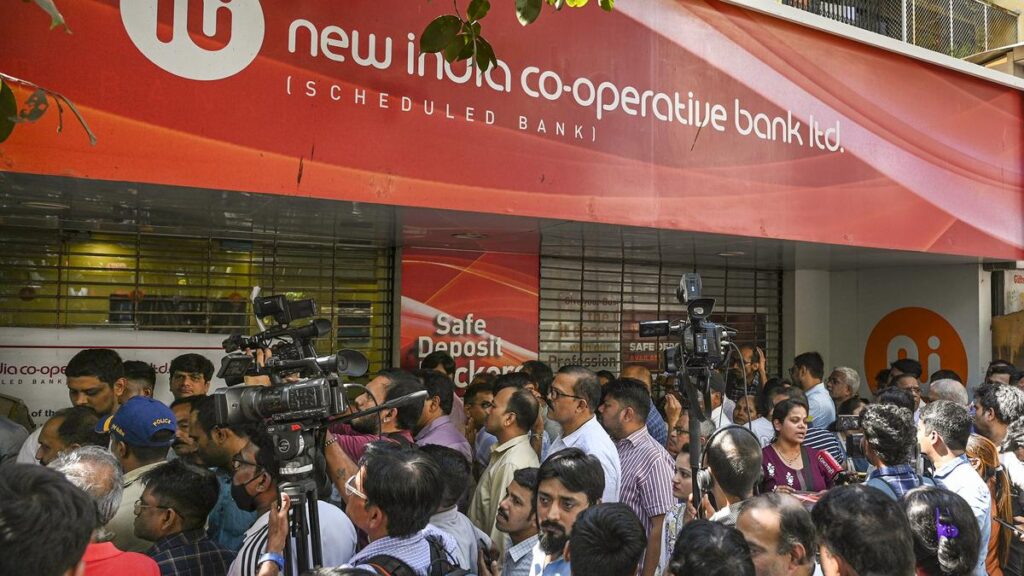
TJSB Sahakari Bank may come to the rescue of fraud-hit New India Co-op Bank
TJSB Sahakari Bank Merger: Potential Rescue Plan for Fraud-Hit New India Co-operative Bank
New India Co-operative Bank faced regulatory action in February 2025 after RBI inspection detected ₹122 crore fund misappropriation. TJSB Sahakari Bank is now considering a potential rescue through merger. Photo: PTI
Table of Contents
- TJSB Sahakari Bank Merger: Potential Rescue Through Amalgamation
- New India Co-operative Bank: Fund Misappropriation and Regulatory Action
- Significance of the Potential Merger in Co-operative Banking
- Depositor Protection: No Haircuts Expected in the Merger
- RBI Directions: Current Restrictions on NICB Operations
- TJSB Sahakari Bank: Profile and Previous Merger Experience
- New India Co-operative Bank: Network and Financial Position
- The Due Diligence Process: Key Focus Areas
- Future Outlook: What the Merger Means for Co-operative Banking
TJSB Sahakari Bank Merger: Potential Rescue Through Amalgamation
In a significant development for India’s co-operative banking sector, Thane-based TJSB Sahakari Bank has initiated due diligence on the fraud-hit New India Co-operative Bank (NICB) for a potential TJSB Sahakari Bank merger. Banking sector sources indicate that this process could lead to a voluntary amalgamation between the two urban co-operative banks (UCBs), with TJSB absorbing the troubled NICB operations. This rescue plan comes at a critical time for NICB, which has been operating under strict Reserve Bank of India (RBI) directions since February 2025.
The TJSB Sahakari Bank merger with NICB, if finalized, would represent a major consolidation move in India’s co-operative banking landscape. TJSB Sahakari Bank, currently ranked as India’s fifth-largest urban co-operative bank, would further strengthen its position while simultaneously providing stability for NICB’s depositors who have been facing uncertainty since regulatory issues emerged. Banking experts suggest that this potential amalgamation demonstrates the resilience of the co-operative banking framework when stronger institutions step in to support troubled entities.
Potential Second-Largest UCB Rescue Operation
If the proposed TJSB Sahakari Bank merger with New India Co-operative Bank materializes, it would become the second-largest rescue of an urban co-operative bank in India’s banking history. The largest such rescue occurred in January 2022 when the fraud-hit Punjab and Maharashtra Co-operative Bank (PMC Bank) was amalgamated with Unity Small Finance Bank following a massive ₹6,500 crore scam perpetrated by a Mumbai-based real estate developer.
New India Co-operative Bank: Fund Misappropriation and Regulatory Action
The troubles at New India Co-operative Bank began in February 2025 when RBI inspection uncovered serious financial irregularities. The regulatory examination detected misappropriation of funds totaling approximately ₹122 crore, prompting immediate supervisory action. While this amount is significantly smaller than the ₹6,500 crore fraud that brought down PMC Bank in 2019, it nevertheless represented a material threat to NICB’s stability and triggered the need for intervention that has led to the potential TJSB Sahakari Bank merger discussions.
Beyond the primary fund misappropriation issue, the TJSB Sahakari Bank merger due diligence is closely examining loans extended by NICB’s Surat-based branch to entities in Uttarakhand, Odisha, and Delhi. These loans have raised red flags during the preliminary assessment and require thorough scrutiny before any amalgamation can proceed. The pattern of questionable lending practices across multiple geographies suggests potential systemic control failures that would need to be addressed as part of any TJSB Sahakari Bank merger agreement.
| Bank | Fraud Amount | Detection Date | Resolution Approach |
|---|---|---|---|
| New India Co-operative Bank | ₹122 crore | February 2025 | Potential voluntary amalgamation with TJSB Sahakari Bank |
| Punjab and Maharashtra Co-operative Bank | ₹6,500 crore | September 2019 | Amalgamated with Unity Small Finance Bank in January 2022 |
Significance of the Potential Merger in Co-operative Banking
The potential TJSB Sahakari Bank merger with NICB holds significant implications for India’s co-operative banking sector. Urban co-operative banks serve a crucial role in India’s financial ecosystem by providing banking services to segments often underserved by larger commercial banks. When UCBs face financial distress, it not only affects immediate depositors but can also trigger confidence issues across the co-operative banking segment. The TJSB Sahakari Bank merger represents a market-based solution that could help maintain stability without requiring direct government intervention.
By pursuing this TJSB Sahakari Bank merger, regulators are demonstrating a preference for resolution through consolidation rather than liquidation. This approach helps preserve the co-operative banking structure while protecting depositor interests. It also suggests a maturing regulatory framework that can facilitate orderly resolution of troubled institutions. The TJSB Sahakari Bank merger would build upon the precedent set by the PMC Bank-Unity Small Finance Bank amalgamation, establishing a pattern for handling similar situations in the future.
TJSB Sahakari Bank
New India Co-operative Bank
Depositor Protection: No Haircuts Expected in the Merger
One of the most critical aspects of the potential TJSB Sahakari Bank merger is the protection of depositor interests. According to banking sector sources close to the negotiations, if the amalgamation proceeds, it will likely happen without any haircut to NICB depositors. This means all account holders would receive their full deposit amounts up to the insured limit, providing much-needed relief to customers who have been operating under uncertainty since the RBI imposed restrictions on the bank in February.
When the RBI issued directions to NICB, it had highlighted that eligible depositors would be entitled to receive deposit insurance claim amounts up to ₹5 lakh based on the submission of willingness by concerned depositors and after due verification. The potential TJSB Sahakari Bank merger would likely eliminate the need for this process, allowing for a smoother transition for depositors who would simply become customers of the merged entity. This approach would help maintain confidence in the co-operative banking system while minimizing disruption for account holders.
Understanding Deposit Insurance in India
Under India’s deposit insurance system administered by the Deposit Insurance and Credit Guarantee Corporation (DICGC), each depositor in a bank is insured up to ₹5 lakh for both principal and interest amounts. This insurance covers all types of deposits including savings, fixed, current, and recurring accounts. In case of a bank merger like the potential TJSB Sahakari Bank merger with NICB, the acquiring bank typically assumes all deposit liabilities, often making the insurance claim process unnecessary for most depositors.
RBI Directions: Current Restrictions on NICB Operations
Since February 13, 2025, New India Co-operative Bank has been operating under strict RBI directions, which are scheduled to remain in force for six months. These restrictions have significantly limited NICB’s operational capabilities, creating challenges for customers and increasing the urgency of finding a permanent solution through options like the TJSB Sahakari Bank merger. Under the current directions, NICB cannot, without prior written approval from the RBI, grant or renew any loans and advances, make investments, incur liabilities, or accept fresh deposits.
The restrictions imposed by the RBI essentially froze NICB’s ability to conduct normal banking operations, though existing customers maintained limited access to their funds. The potential TJSB Sahakari Bank merger would release the bank from these constraints by transferring operations to a financially stable institution. For NICB’s customers, the completion of the TJSB Sahakari Bank merger would restore full banking services and normalize their banking experience after months of limitations.
TJSB Sahakari Bank: Profile and Previous Merger Experience
TJSB Sahakari Bank has established itself as one of India’s leading urban co-operative banks, with approximately 150 branches spread across five states: Maharashtra, Goa, Karnataka, Gujarat, and Madhya Pradesh. As of March 2025, TJSB reported a total business volume (deposits plus advances) of ₹23,105 crore, demonstrating its significant scale in the co-operative banking sector. This robust financial position makes TJSB Sahakari Bank a suitable candidate to undertake the proposed merger with the troubled NICB.
Importantly, the potential TJSB Sahakari Bank merger with NICB would not be the institution’s first experience with bank amalgamations. TJSB has successfully executed several mergers in the past, including the February 2025 voluntary amalgamation of The Citizen Co-operative Bank from Vasco-De-Gama, Goa. Additionally, in 2007-08, the RBI approved TJSB’s merger with two Pune-based UCBs – Navjeevan Nagri Sahakari Bank and Shree Sadguru Jangli Maharaj Sahakari Bank. This established track record of successful integrations provides confidence that TJSB could effectively manage the complexities involved in absorbing NICB’s operations.
Benefits of the TJSB-NICB Merger for Stakeholders
- For NICB Depositors: Full protection of deposits without haircuts, restoration of normal banking services, access to TJSB’s wider branch network
- For TJSB Sahakari Bank: Expanded presence in key markets including Mumbai and Surat, increased deposit base, potential for operational synergies
- For Regulators: Orderly resolution of a troubled institution without systemic impact, preservation of co-operative banking structure
- For Banking System: Enhanced stability in the co-operative sector, demonstration of effective resolution mechanisms
New India Co-operative Bank: Network and Financial Position
New India Co-operative Bank operates a network of 28 branches strategically located across two states. In Maharashtra, NICB maintains a presence in Mumbai, Thane and Palghar districts, Navi Mumbai, and Pune, while its Gujarat operations consist of two branches in Surat. This regional footprint, particularly in Mumbai’s financial hub, represents a potentially valuable addition to TJSB through the proposed merger. For TJSB Sahakari Bank, the merger would strengthen its presence in these key markets.
As of March 2024, before the detection of financial irregularities, NICB reported deposits of ₹2,436.37 crore and advances of ₹1,174.84 crore. These figures demonstrate the substantial size of NICB despite its challenges, explaining why a merger solution rather than liquidation is being pursued. If the TJSB Sahakari Bank merger proceeds, it would integrate these assets and liabilities into TJSB’s larger operation, potentially creating operational efficiencies while providing a stable future for NICB’s customer relationships.
The Due Diligence Process: Key Focus Areas
The ongoing due diligence for the potential TJSB Sahakari Bank merger involves a comprehensive examination of NICB’s financial position, asset quality, and operational capabilities. Beyond the already identified ₹122 crore fund misappropriation, the investigation is focusing particularly on loans extended by NICB’s Surat branches to entities in Uttarakhand, Odisha, and Delhi. The geographic dispersion of these loans has raised concerns about their legitimacy and recovery prospects, making them a critical aspect of the due diligence process.
As part of the TJSB Sahakari Bank merger assessment, investigators will likely review credit approval processes, collateral valuations, documentation practices, and compliance with regulatory requirements. The findings will help determine the true financial condition of NICB and the potential impact of integration on TJSB’s financial stability. Only after completing this thorough due diligence will TJSB Sahakari Bank make a final decision on whether to proceed with the amalgamation and under what specific terms.
Future Outlook: What the Merger Means for Co-operative Banking
The potential TJSB Sahakari Bank merger with NICB reflects broader trends in India’s banking sector toward consolidation and stronger regulatory oversight. Urban co-operative banks have historically played a vital role in providing financial services to middle and lower-middle-class customers, particularly in semi-urban and urban areas. However, governance challenges and fraud cases in recent years have highlighted the need for structural reforms and stronger institutions within this sector.
If successfully executed, the TJSB Sahakari Bank merger would demonstrate that the co-operative banking sector can address challenges through market-based solutions rather than requiring taxpayer-funded bailouts. This approach aligns with the broader financial sector reforms being pursued by regulators, which aim to create stronger, more resilient institutions while preserving the unique community-oriented characteristics of co-operative banks. The outcome of this merger will be closely watched by stakeholders across India’s banking landscape as it could set important precedents for future consolidation in the sector.
As the due diligence process continues, both TJSB Sahakari Bank and regulatory authorities will work to ensure that any merger agreement protects depositor interests while creating a stronger combined entity. For customers of both institutions, particularly those affected by the current restrictions at NICB, the merger represents hope for a return to normalized banking services and long-term stability. The banking sector will continue monitoring developments in this significant potential consolidation as it progresses through the regulatory approval process in the coming months.







